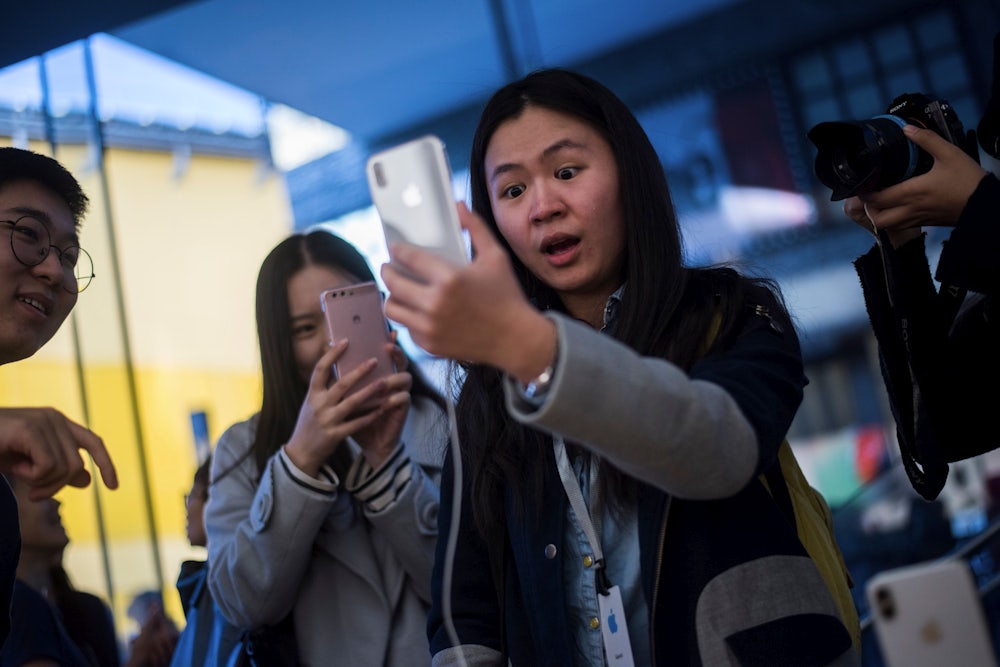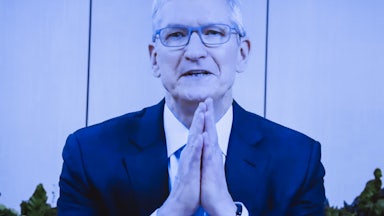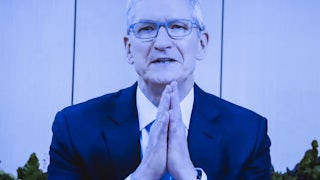While other tech giants have spent the last several years mired in privacy scandals, Apple has charted a different course, branding itself as the juggernaut that cares about your civil liberties. Google and Facebook, whose businesses are built on aggressive and invasive testing on their human subjects, have had to cope with well-publicized data breaches. Apple, meanwhile, has taken a different view; the company even introduced a feature last month that allows users to opt out of the invasive tracking that allows that pair of sweatpants you once thought about to relentlessly stalk you from Instagram to Facebook to your web browser and back again like the sex demon from It Follows. As skepticism about the power of tech companies and their near-limitless access to reams of personal data grows, Apple has largely avoided the criticism its competitors have received.
“Privacy to us is a human right. It’s a civil liberty, and something that is unique to America. This is like freedom of speech and freedom of the press,” Apple CEO Tim Cook vowed in 2018. “Privacy is right up there with that for us.” At the time, that awkwardly placed “unique to America” might have been dismissed as a slip of the tongue. But maybe not: As Apple has pushed itself as the tech company that won’t violate its user policies, it has continued to do business in China. And now a damning New York Times investigation published on Monday found that the company has been, all this while, happily collaborating with the Chinese government.
Apple’s commitment to civil liberties has always been a fig leaf, more a branding strategy than an actual position. The company still collects troves of user data and allows apps to flourish on its platform that do the same, albeit in a less flagrant manner than some of its competitors. But its dealings with China should end the myth of Apple as a company committed to privacy.
In the last four years, 55,000 apps have been removed from the App Store in China. Many of these were games, but thousands of others included apps that bring content from foreign news outlets, as well as those that provide encrypted messaging services. In 2018, moreover, China got Apple to remove an app from a prominent critic of the ruling Communist Party. “This app and any Guo Wengui app cannot be on the China store,” officials wrote in an email to Apple. The App Store not only removed the app, it fired the reviewer responsible for approving it in the first place.
But not all of the censorship comes at the request of Chinese officials. Apple also proactively removes apps in an effort to placate the Chinese government. Philip Shoemaker, who ran the App Store until 2016, told The New York Times that his team was given a list of topics that “could not appear in apps in the country, including Tiananmen Square and independence for Tibet and Taiwan.” Meanwhile, an app from “the Chinese paramilitary group accused of detaining and abusing Uyghurs” was allowed in the App Store.
Apple also shares customer data with the Chinese government—an astonishing step given Cook’s invocation of privacy as a “human right.” Although the U.S. government forbids American companies from turning data over to Chinese authorities, Apple and China have found a workaround. Apple has “ceded legal ownership” of its data to Guizhou-Cloud Big Data, a company owned by a Chinese province. The terms and conditions now read, per the Times, that “Apple and GCBD will have access to all data that you store on this service” and can share data “between each other under applicable law.” To get user data, China can cut Apple out completely—it simply has to ask GCBD directly. Apple also uses different encryption keys in China than it does elsewhere in the world in a bid to placate Chinese authorities.
Apple gleefully defies its own dictums in China because the company is so successful there. In the 2019 fiscal year, it raked in approximately $44 billion there—more than Nike. China knows its importance to the company’s business and has used it as leverage to extract concessions everywhere. The result is an authoritarian nightmare, in which Apple has effectively given the country access to its data and written it all down as the cost of doing business, and fattening profits. It’s especially egregious given the fulsome effort Apple has undertaken to cast itself as the one tech company among the industry’s titans that nobly and with great self-sacrifice holds itself to a higher ethical standard; the firm that cares deeply about protecting its users’ privacy. Those platitudes, it seems, do not extend beyond America’s borders. The consequences, however, will.








